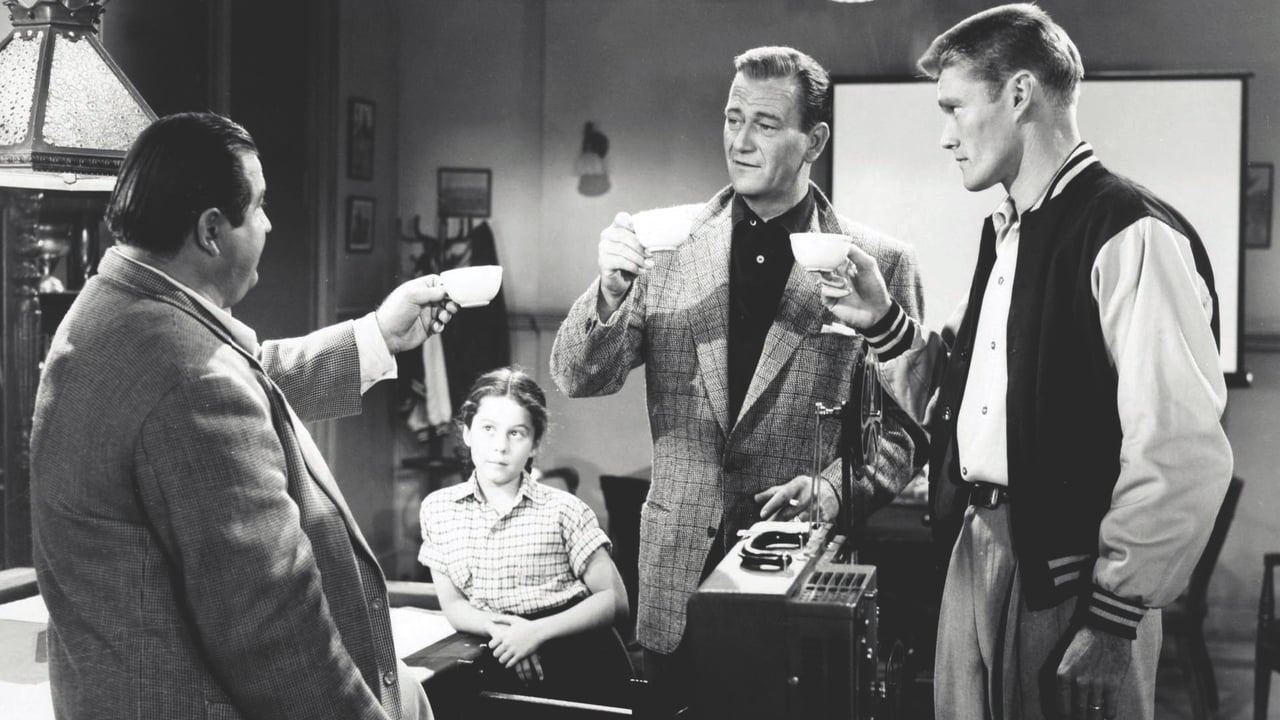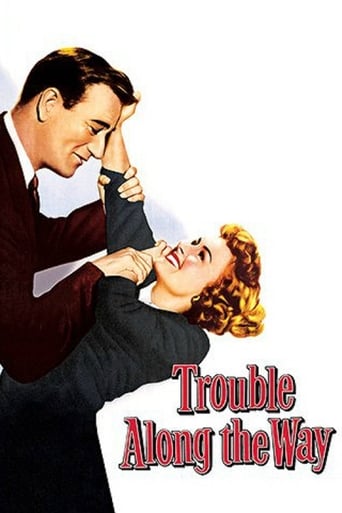Matialth
Good concept, poorly executed.
Supelice
Dreadfully Boring
TrueHello
Fun premise, good actors, bad writing. This film seemed to have potential at the beginning but it quickly devolves into a trite action film. Ultimately it's very boring.
Portia Hilton
Blistering performances.
wes-connors
Hard times hit "Saint Anthony's College" and blustery old Charles Coburn (as Matthew William Burke) is advised to close the university, which is $170,000 in debt. Believing "the Lord will provide," Father Coburn reads God's advice in Deuteronomy 32:15, "The beloved grew fat, and kicked." So, he hires washed-up football coach John Wayne (as Stephen "Steve" Aloysius Williams) to turn the school's team into money-making winners. Although initially refusing, Mr. Wayne decides to accept the Priest's offer when "Domestic Relations Court" officer Donna Reed (as Alice Singleton) catches him with a hangover and dirty dishes...Wayne's whorish ex-wife, Marie Windsor (as Anne), isn't interested in their daughter, telling Wayne, "I want you to visit me" since her new husband only raises her "to the heights" with his checkbook. Wayne appreciates Ms. Windsor's directness, but declines. He moves to the Christian school with cute eleven-year-old tomboy Sherry Jackson (as Carol). Ms. Reed sees the wholesome environment as an improvement, but still feels heavy drinking and smoking Wayne is a "degenerate" influence on his daughter. To make matters worse, Wayne has psychoanalyzed Reed as a sexually uptight virgin who needs to be taken by force… "Trouble Along the Way" is both intentionally and unintentionally funny. It's filled with clichés, like Wayne's "Winning isn't everything, it's the only thing" motto. Before his "you-know-you-want-it" moment with Reed, Wayne issues some amusing guidelines for lonely women, "In the best Christian tradition, I'm gonna return good for evil," he advises Reed, "Start winking at strange men. Drop your gloves anytime you're in an elevator with an eligible bachelor. Go boat-riding with lonesome sailors. Get out on the town! Let life rub up against ya! And, then maybe some man'll do this to ya!" ...LOL... At least, young Jackson is endearing.**** Trouble Along the Way (4/4/53) Michael Curtiz ~ John Wayne, Donna Reed, Charles Coburn, Sherry Jackson
frncsbrennan
This was a John Wayne Film I hadn't seen before, and I was surprised that it was so good. Wayne played it nice and low key, with a bit of humor thrown in. There's a real chemistry between John Wayne and Donna Reed, who plays a social worker that is being used by Steve Williams' (Wayne) ex-wife to take his daughter away from him. But little Shirley Jackson really steals the show as Waynes wise-cracking tomboy daughter, Carol. (Who would have thought that little tomboy would grow up into one of the most beautiful women ever to be on film.) She reminded me of Lucy (Quinn Cummmings) in The Goodbye Girl. Charles Coburn is tops as usual, playing the old priest who is desperate to save his college, St. Anthonys, and he turns to Wayne for help. And a crew cut Chuck Conners has a small bit as one of coach Williams assistants. All around, a very entertaining film; which is no surprise with Michael Curtiz as the director.
Jay Raskin
This movie mixes two genres. First, there's the sports story genre with a has been coach making a come-back with a loser team. Second, there's the single, loving father trying to prove he's a good parent and hold onto his child. In a way, we're getting two movies in one. Both of them are fine and are mildly entertaining.The sports story and the coach character isn't far from the usual John Wayne Cowboy/Military officer role. He is quite effective in this. However as the father, in the family story, he is cool when he should be warm and he hardly registers much emotion when he realizes he might lose her. This is a part that Cary Grant would have been perfect for.Adorable Sherry Jackson as the daughter is a lot of fun and it is easy to see why she got her long running television series with Danny Thomas. Donna Reed gives an extraordinary intelligent performance as the social worker trying to protect Jackson. It is also easy to see why she also starred in a long running television series five years later.The setting of the movie at a small Catholic College is probably a mistake. There is just not that much humor there. Probably because the censorship office was controlled by Catholics, there was a limit on how much you could let the audience laugh at the priests. Director Curtiz does come as close to that limit as any movie of the time.The best scene is when Wayne finds out that the football schedule for the team he has just taken over includes the toughest teams in college football. Here, Wayne lets himself go and actually registers a new emotion for him - fear.The sexual politics in the movie is so frightening and bizarre, I don't even want to analyze it. I'll just say that at one point Wayne suddenly grabs Reed against her will and forcibly kisses her, although she has not shown the slightest interest in him before this point. He tells her that this is what she really wants and finally she admits it. One has to cringe for her and all women who had to live in the 1950's.I think if this film had been more successful, Wayne would have broken away from the cowboy/military stereotypes and done some interesting movies in the last two decades of his life. Unfortunately, the movie wasn't that successful and he went back to the safe stereotypical tough as nails roles.
larryblanks
The quote "Winning isn't everything, it's the only thing" was actually a quote made by John Wayne in this 1953 film, "Trouble Along The Way". John Wayne does a fine job playing a college football coach, Steve Williams, who get's incorrectly caught up in a recruiting scandal. Sherry Jackson plays his daughter who idolizes him and demonstrates her excellent acting ability. I'm not a big football fan, but really enjoyed this film. Not only for the nostalgic look at the days when college football was fun and not the principal business of the university, but for the ethics that were around during that period of time.Wayne makes the statement in the film many years before Vince Lombardi is credited with it.

